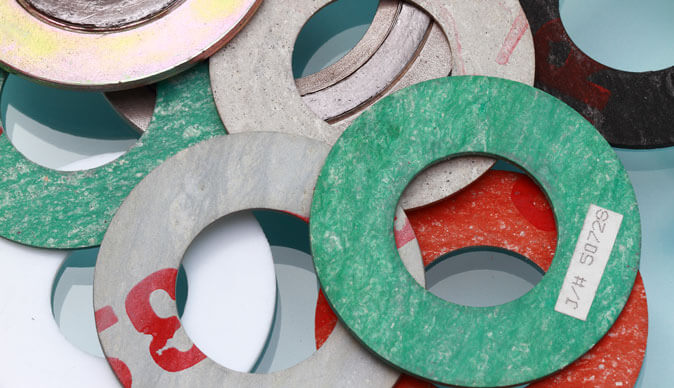Rubber and fibre washers are two common types of washers used in various industries.
Here are their benefits and the industries where they are frequently employed:
Rubber Washers:
- Sealing and Waterproofing: Rubber washers are known for their excellent sealing properties. They can create a watertight or airtight seal, preventing the leakage of fluids or gases. This makes them suitable for applications where sealing against moisture, dust, or environmental elements is critical, such as plumbing, HVAC systems, automotive engines, and hydraulic systems.
- Vibration and Shock Absorption: Rubber washers are effective in dampening vibrations and absorbing shocks. They act as cushions between components, reducing the transmission of vibrations and minimizing the risk of component damage or loosening of fasteners. They are commonly used in machinery, appliances, automotive suspensions, and equipment mounts.
- Electrical Insulation: Rubber washers provide electrical insulation properties, making them useful in electrical and electronic applications. They help to prevent electrical current flow between conductive components, reducing the risk of short circuits or electrical damage. They are used in electrical installations, circuit boards, and equipment grounding.
- Flexibility and Conformity: Rubber washers are flexible and can conform to uneven or irregular surfaces. This allows them to provide a tight and secure fit, even on surfaces with imperfections. They are widely used in industries such as automotive, plumbing, and construction, where components may have varying heights, surface textures, or misalignments.
- Chemical Resistance: Rubber washers exhibit resistance to various chemicals, oils, and solvents. This makes them suitable for applications where exposure to aggressive fluids or chemicals is expected, such as chemical processing, oil refineries, and industrial machinery.
Fiber Washers:
- Load Distribution: Fiber washers are commonly used for load distribution and stress dispersion. They help distribute the load evenly over a larger surface area, reducing the risk of damage or deformation to the connected components. They find applications in industries like construction, machinery, and automotive manufacturing.
- Insulation: Fiber washers can provide electrical insulation in certain applications. They help isolate conductive components, preventing the flow of electric current and minimizing the possibility of electrical shorts. They are utilized in electrical installations, equipment grounding, and electronics assembly.
- Non-Conductivity: Fiber washers are non-conductive materials, which makes them suitable for applications requiring electrical isolation or where there is a need to prevent the transmission of electrical currents between components.
- Corrosion Resistance: Certain types of fibre washers, such as those made from materials like nylon or phenolic, offer good resistance to corrosion. They are used in environments where exposure to moisture, chemicals, or corrosive agents is expected, such as marine applications, chemical plants, and outdoor equipment.
- Thermal Insulation: Fiber washers can provide a certain level of thermal insulation, helping to reduce heat transfer between components. They find applications in industries where thermal management is crucial, such as power electronics, electrical equipment, and high-temperature environments.
Rubber and fibre washers have diverse applications across industries such as automotive, construction, plumbing, electronics, machinery, and more. Their unique properties make them valuable components in sealing, vibration damping, insulation, load distribution, and protection against environmental factors or electrical risks.
Washers are made from a variety of materials, depending on the specific application requirements. Here are some common materials used for manufacturing washers:
- Metal (Steel, Stainless Steel, Brass, Aluminium): Metal washers are widely used due to their strength, durability, and resistance to high temperatures. Steel washers, including carbon steel and stainless steel, are popular choices for general-purpose applications. Brass washers are often used for their corrosion resistance and electrical conductivity. Aluminium washers are lightweight and commonly used in applications where weight is a concern.
- Rubber: Rubber washers, typically made from materials like neoprene, silicone, or EPDM (ethylene propylene diene monomer), offer excellent sealing properties and flexibility. They are used for sealing applications and as vibration dampeners in various industries.
- Fiber: Fiber washers are often made from materials such as nylon, phenolic, or fiber-reinforced plastics. These materials provide good load distribution, electrical insulation, and corrosion resistance. Fiber washers are commonly used in electrical applications, machinery, and construction.
- Plastic: Plastic washers, such as nylon or polyethylene, are lightweight, non-conductive, and resistant to chemicals and corrosion. They are commonly used in electrical applications, plumbing, and general-purpose fastening where weight reduction or electrical insulation is important.
- Rubber-Steel Composite: Rubber-steel composite washers consist of a rubber layer bonded to a steel washer. This combination provides the benefits of both materials, such as sealing capabilities from rubber and load distribution and strength from steel. They are commonly used in applications where sealing, vibration damping, and secure fastening are required.
- Fibrous Materials: Certain washers are made from fibrous materials like paper or fibreboard. These washers are typically used in low-load applications or as gaskets in environments with low pressures or temperatures.
The material selection for washers depends on factors such as load requirements, chemical resistance, electrical properties, temperature conditions, and cost-effectiveness for the specific application. Manufacturers choose materials that offer the desired characteristics to ensure optimal performance and longevity in their intended applications.


